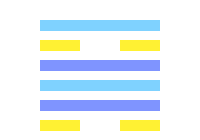50.1.2.4.5 (50 > 37)

50.1.2.4.5 (50 > 37) - THE TING HEXAGRAM.
- 1. The first line, divided, shows the caldron overthrown and its feet turned up. (But) there will be advantage in its getting rid of what was bad in it. (Or it shows us) the concubine (whose position is improved) by means of her son. There will be no error.
- 2. The second line, undivided, shows the caldron with the things (to be cooked) in it. (If its subject can say), ‘My enemy dislikes me, but he cannot approach me,’ there will be good fortune.
- 4. The fourth line, undivided, shows the caldron with its feet broken ; and its contents, designed for the ruler's use, overturned and spilt. Its subject will be made to blush for shame. There will be evil.
- 5. The fifth line, divided, shows the caldron with yellow ears and rings of metal in them. There will be advantage through being firm and correct.
50.1.2.4.5 (50 > 37) - Involvement
One stops his presentation when others are not attentive.
Bing DeepL Google Yandex50.1.2.4.5 (50 > 37) - Involvement
One stops his presentation when others are not attentive.
Bing DeepL Google Yandex50.1.2.4.5 (50 > 37) - T’ing, le chaudron
T’ing : chaudron à trois pieds, vase du sacrifice, sacrifice.
-
1. Quand le chaudron est retourné, on peut aisément en faire tomber ce qui est mauvais (et s’attacher au bien). Une concubine qui a un fils n’aura point de regret d’avoir été prise comme telle.
Note. Nous avons ici deux proverbes signifiant que « le bien peut venir du mal ». Le fils de la concubine peut devenir héritier et, en tout cas, assure une position honorable à sa mère. - 2. Chaudron plein de fruits. — Mon chaudron est plein, mais mon commensal ne peut venir à moi. — Symboles des peines perdues ou d’un cœur vertueux.
- 4. Si le chaudron a le pied brisé, les aliments préparés pour le prince sont renversés ; tout l’extérieur en est souillé. (Symbole du manque de fidélité.)
- 5. Un chaudron aux oreilles, aux anneaux d’or, représente la prospérité venant de la fidélité.
50.1.2.4.5 (50 > 37) - L'engagement
On arrête sa présentation quand les autres ne sont pas attentifs.
Bing DeepL Google Yandex50.1.2.4.5 (50 > 37) - Bevonás
- 1. Felkészül abból amit mások elrontottak hogy segíthessen rajtuk.
- 2. Sikeresebb társainál mert jobbak az eszközei.
- 4. Meg kell javítania amit eltört.
- 5. Készen áll hogy segítsen.
Les trigrammes
Les trigrammes sont des combinaisons de trois traits yin et yang. Dans l'hexagramme, les trois traits du dessous constituent le trigramme inférieur et représentent la situation intérieure. Les trois lignes du haut constituent le trigramme supérieur et représentent la situation extérieure.
Trigramme supérieur : Le feu Le vent


Trigramme inférieur : Le vent Le feu


La formation: 50
What is already there

50 - THE TING HEXAGRAM.
Ting gives the intimation of great progress and success.
Bing DeepL Google Yandex50 - T’ing, le chaudron
T’ing : chaudron à trois pieds, vase du sacrifice, sacrifice.
Ko « vase à cuire (pour le sacrifice), symbole d’un principe heureux et d’un développement avantageux ». Les saints cuisaient les offrandes pour honorer Shang-ti et faisaient de grandes fêtes pour entretenir les saints et les sages.
Texte
Le chaudron est un symbole de principe heureux ; de développement prospère.
Symbolisme
Le feu entrant dans le bois figure « cuire ». Le sage garde sa dignité et maintient son destin céleste.
Commentaire
Les saints cuisaient leurs offrandes pour honorer Shang-ti et faisaient de grands festins pour entretenir les hommes saints et sages.
La docilité et la finesse d’ouïe, la clarté de la vue chez le faible qui progresse et s’élève, qui garde le milieu, obéit au puissant et s’accorde avec lui, tout cela donne la prospérité et le succès.

50.1 (50 > 14) - THE TING HEXAGRAM.
The first line, divided, shows the caldron overthrown and its feet turned up. (But) there will be advantage in its getting rid of what was bad in it. (Or it shows us) the concubine (whose position is improved) by means of her son. There will be no error.
Bing DeepL Google Yandex50.1 (50 > 14) - Doing recovery
One prepares what others have set aside to make it useful.
Bing DeepL Google Yandex50.1 (50 > 14) - Doing recovery
One prepares what others have set aside to make it useful.
Bing DeepL Google Yandex50.1 (50 > 14) - T’ing, le chaudron
T’ing : chaudron à trois pieds, vase du sacrifice, sacrifice.
Quand le chaudron est retourné, on peut aisément en faire tomber ce qui est mauvais (et s’attacher au bien). Une concubine qui a un fils n’aura point de regret d’avoir été prise comme telle.
Note. Nous avons ici deux proverbes signifiant que « le bien peut venir du mal ». Le fils de la concubine peut devenir héritier et, en tout cas, assure une position honorable à sa mère.
50.1 (50 > 14) - Faire de la récupération
On prépare ce que les autres ont mis de côté pour qu'il soit utile.
Bing DeepL Google Yandex50.1 (50 > 14) - Bevonás
Felkészül abból amit mások elrontottak hogy segíthessen rajtuk.
Bing DeepL Google Yandex
50.2 (50 > 56) - THE TING HEXAGRAM.
The second line, undivided, shows the caldron with the things (to be cooked) in it. (If its subject can say), ‘My enemy dislikes me, but he cannot approach me,’ there will be good fortune.
Bing DeepL Google Yandex50.2 (50 > 56) - Arousing envy
One succeeds better than one's friends because one has gotten supplies.
Bing DeepL Google Yandex50.2 (50 > 56) - Arousing envy
One succeeds better than one's friends because one has gotten supplies.
Bing DeepL Google Yandex50.2 (50 > 56) - T’ing, le chaudron
T’ing : chaudron à trois pieds, vase du sacrifice, sacrifice.
Chaudron plein de fruits. — Mon chaudron est plein, mais mon commensal ne peut venir à moi. — Symboles des peines perdues ou d’un cœur vertueux.
Bing DeepL Google Yandex50.2 (50 > 56) - Faire des envieux
On réussit mieux que ses amis car on s'est approvisionné.
Bing DeepL Google Yandex
50.4 (50 > 18) - THE TING HEXAGRAM.
The fourth line, undivided, shows the caldron with its feet broken ; and its contents, designed for the ruler's use, overturned and spilt. Its subject will be made to blush for shame. There will be evil.
Bing DeepL Google Yandex50.4 (50 > 18) - Causing damage
One has to repair because one broke something.
Bing DeepL Google Yandex50.4 (50 > 18) - Causing damage
One has to repair because one broke something.
Bing DeepL Google Yandex50.4 (50 > 18) - T’ing, le chaudron
T’ing : chaudron à trois pieds, vase du sacrifice, sacrifice.
Si le chaudron a le pied brisé, les aliments préparés pour le prince sont renversés ; tout l’extérieur en est souillé. (Symbole du manque de fidélité.)
Bing DeepL Google Yandex50.4 (50 > 18) - Causer des dommages
On doit réparer car on a cassé quelque chose.
Bing DeepL Google Yandex
50.5 (50 > 44) - THE TING HEXAGRAM.
The fifth line, divided, shows the caldron with yellow ears and rings of metal in them. There will be advantage through being firm and correct.
Bing DeepL Google Yandex50.5 (50 > 44) - T’ing, le chaudron
T’ing : chaudron à trois pieds, vase du sacrifice, sacrifice.
Un chaudron aux oreilles, aux anneaux d’or, représente la prospérité venant de la fidélité.
Bing DeepL Google YandexEn préparation : 37
Ce qui est en passe d'arriver

37 - THE KIÂ ZĂN HEXAGRAM.
For (the realisation of what is taught in) Kiâ Zăn, (or for the regulation of the family), what is most advantageous is that the wife be firm and correct.
Bing DeepL Google Yandex37 - Kia, la parenté, le clan
Kiā : famille, maison.
Texte
L’homme lui donne la prospérité, la femme la complète et la consolide.
Symbolisme
Vent sortant du feu. Le sage parle selon la réalité et tient une conduite toujours bien réglée.
Commentaire
La femme remplit les fonctions à l’intérieur ; l’homme à l’extérieur. L’observance des règles dans leurs actes et leurs rapports, c’est le suprême droit du ciel et de la terre. Le chef de maison a la dignité, l’autorité suprême ; il est appelé père-mère. Quand le père et le fils, les frères aînés et les cadets, les époux, sont ce qu’ils doivent être, la maison est bien réglée et le monde est en ordre parfait.
L'hexagramme nucléaire : 43.1.3.5.6 (43 > 64)
L'hexagramme nucléaire est l'association des deux trigrammes intérieurs (traits 2,3,4 et 3,4,5). Il représente la racine, ou l'origine de la situation.

43.1.3.5.6 (43 > 64) - THE KWÂI HEXAGRAM.
- 1. The first line, undivided, shows its subject in (the pride of) strength advancing with his toes. He goes forward, but will not succeed. There will be ground for blame.
- 3. The third line, undivided, shows its subject (about to advance) with strong (and determined) looks. There will be evil. (But) the superior man, bent on cutting off (the criminal), will walk alone and encounter the rain, (till he be hated by his proper associates) as if he were contaminated (by the others). (In the end) there will be no blame against him.
- 5. The fifth line, undivided, shows (the small men like) a bed of purslain, which ought to be uprooted with the utmost determination. (The subject of the line having such determination), his action, in harmony with his central position, will lead to no error or blame.
- 6. The sixth line, divided, shows its subject without any (helpers) on whom to call. His end will be evil.
43.1.3.5.6 (43 > 64) - Revelation
One does not return to what others have done because one does not want to compromise the reconciliation process.
Bing DeepL Google Yandex43.1.3.5.6 (43 > 64) - Revelation
One does not return to what others have done because one does not want to compromise the reconciliation process.
Bing DeepL Google Yandex43.1.3.5.6 (43 > 64) - Kwài, la décision
Kwāi : 1. Rivière divisée en branches ; diviser, couper, disperser ; 2. Décider, régler définitivement, résolu, tranchant ; 3. Habileté, art, prudence.
-
1. Celui qui marche en faisant parade de sa force échouera dans ses entreprises. Il aura à s’en repentir.
Vaincu, il s’en ira plein de regret. -
3. Celui qui met sa force dans ses mâchoires* aura malheur. Le sage est résolu, réglé ; partout, il va seul. S’il lui survient des désagréments qui lui attirent la malveillance, il n’en subira aucun résultat fâcheux.
Le sage est résolu, bien réglé, partant il ne se crée pas de regret.
* En ses vantardises. La force, la violence se montre sur son visage.
- 5. Ferme et résolu, comme un mont couvert d’artemisias, suivant le chemin du milieu, on n’aura point de regret.
- 6. Si l’on n’a personne que l’on puisse appeler à son secours (bien que ferme et habile), on aura à la fin des revers.
43.1.3.5.6 (43 > 64) - La révélation
On ne revient pas sur ce que les autres ont fait car on ne veut pas compromettre le processus de réconciliation.
Bing DeepL Google Yandex43.1.3.5.6 (43 > 64) - Kinyilatkoztatás
- 1. Fennál a veszélye a törésnek ha megmutatja beállítottságát. Kerülni kell a feltűnést.
- 3. Eldobja a legkevésbé fontosat.
- 5. A többiek visszatérnek mert nem akarja folytatni.
- 6. Ha valaki nem akar zavarba kerülni, meggondolatlanság lenne nem kérdezni.
Guide
La situation de départ

50.5 (50 > 44) - THE TING HEXAGRAM.
The fifth line, divided, shows the caldron with yellow ears and rings of metal in them. There will be advantage through being firm and correct.
Bing DeepL Google Yandex50.5 (50 > 44) - T’ing, le chaudron
T’ing : chaudron à trois pieds, vase du sacrifice, sacrifice.
Un chaudron aux oreilles, aux anneaux d’or, représente la prospérité venant de la fidélité.
Bing DeepL Google YandexCorrection
La direction suivant laquelle le guide va plier

50.1.2.4 (50 > 22) - THE TING HEXAGRAM.
- 1. The first line, divided, shows the caldron overthrown and its feet turned up. (But) there will be advantage in its getting rid of what was bad in it. (Or it shows us) the concubine (whose position is improved) by means of her son. There will be no error.
- 2. The second line, undivided, shows the caldron with the things (to be cooked) in it. (If its subject can say), ‘My enemy dislikes me, but he cannot approach me,’ there will be good fortune.
- 4. The fourth line, undivided, shows the caldron with its feet broken ; and its contents, designed for the ruler's use, overturned and spilt. Its subject will be made to blush for shame. There will be evil.
50.1.2.4 (50 > 22) - T’ing, le chaudron
T’ing : chaudron à trois pieds, vase du sacrifice, sacrifice.
-
1. Quand le chaudron est retourné, on peut aisément en faire tomber ce qui est mauvais (et s’attacher au bien). Une concubine qui a un fils n’aura point de regret d’avoir été prise comme telle.
Note. Nous avons ici deux proverbes signifiant que « le bien peut venir du mal ». Le fils de la concubine peut devenir héritier et, en tout cas, assure une position honorable à sa mère. - 2. Chaudron plein de fruits. — Mon chaudron est plein, mais mon commensal ne peut venir à moi. — Symboles des peines perdues ou d’un cœur vertueux.
- 4. Si le chaudron a le pied brisé, les aliments préparés pour le prince sont renversés ; tout l’extérieur en est souillé. (Symbole du manque de fidélité.)
50.1.2.4 (50 > 22) - Bevonás
- 1. Felkészül abból amit mások elrontottak hogy segíthessen rajtuk.
- 2. Sikeresebb társainál mert jobbak az eszközei.
- 4. Meg kell javítania amit eltört.
Forum
Avez-vous besoin d'aide pour comprendre ce tirage ?
Rejoignez le forum et demandez de l'aide.
BBCode
Le BBCode ci-dessous est à votre disposition pour être copié-collé dans votre fil de discussion.
Link
Lien vers ce tirage

